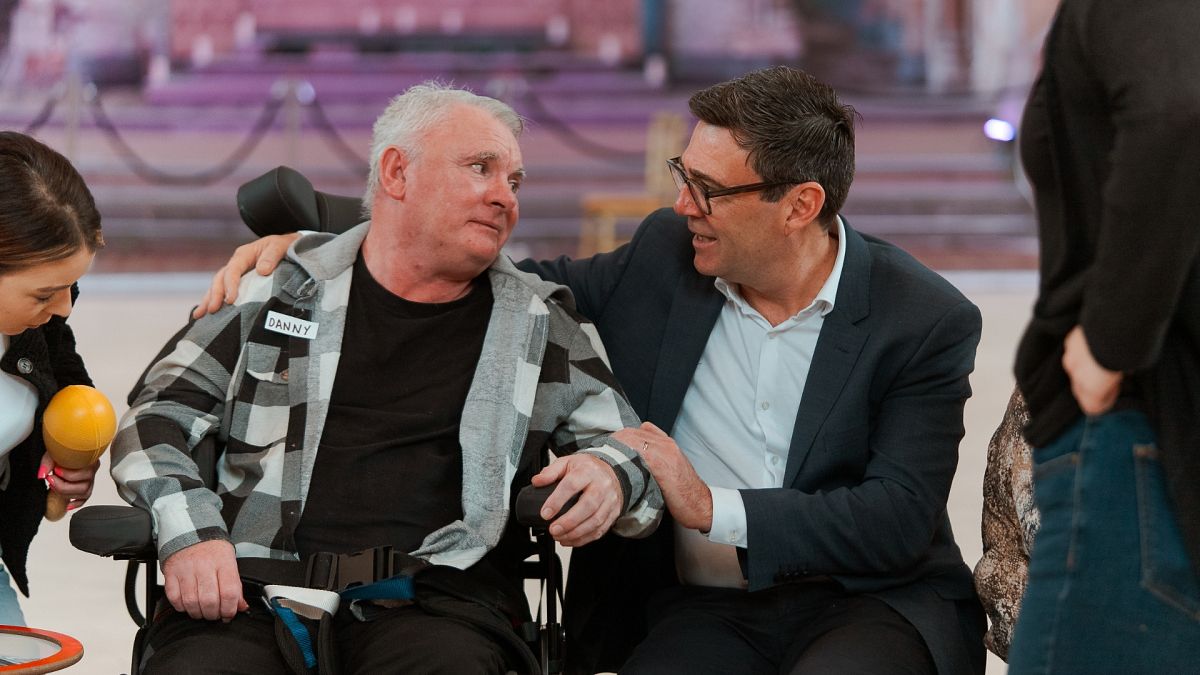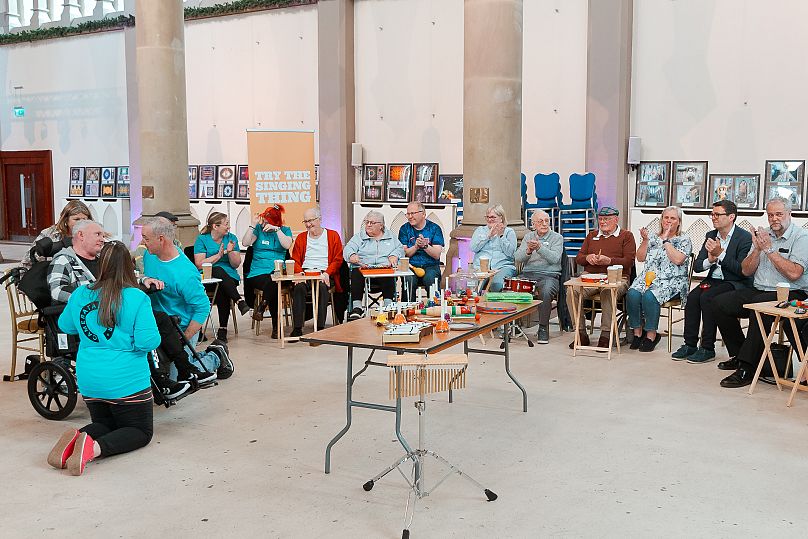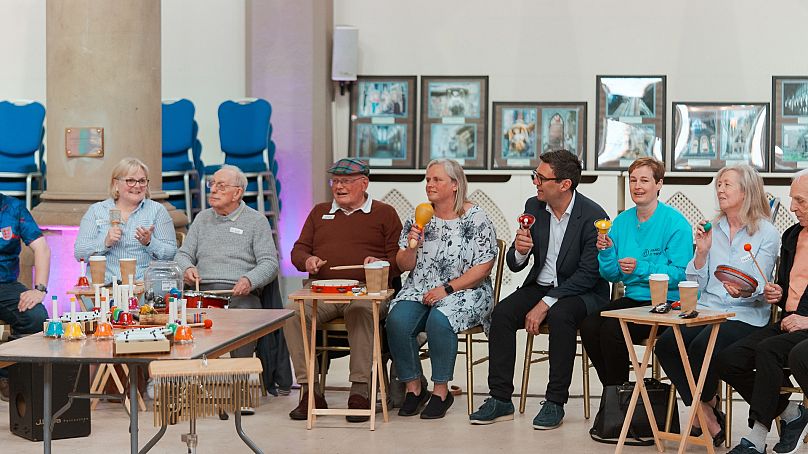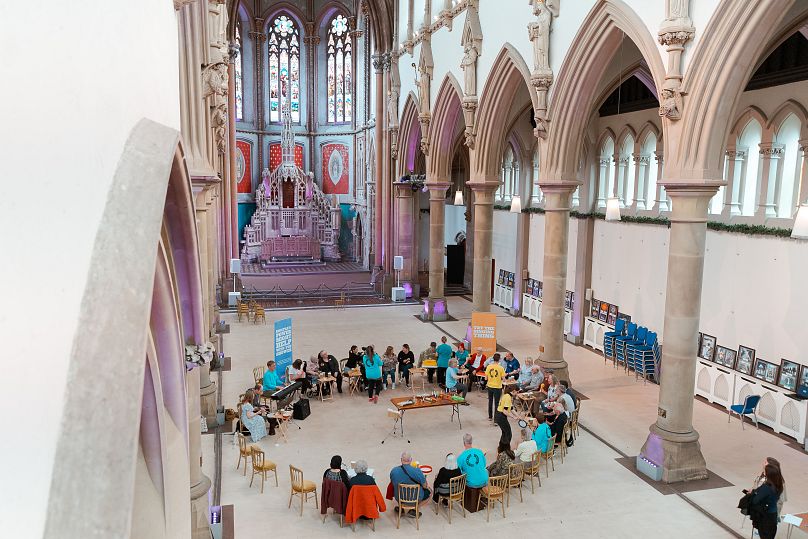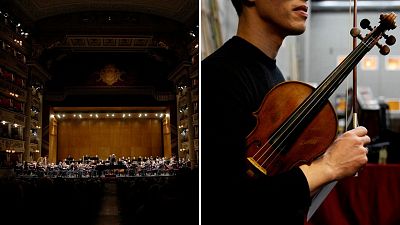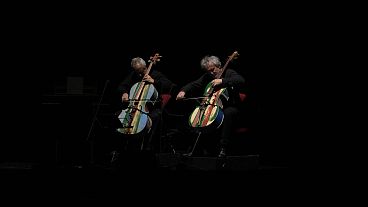A Manchester orchestra has joined forces with universities and the healthcare system to roll out a programme of dementia music therapy sessions across the city.
In the beautifully restored main hall of the Gorton Monastery in Manchester, a man in a wheelchair starts singing ‘Danny Boy’. The man has dementia and is part of a weekly group that gives people living with the debilitating illness support through musical workshops.
The man’s voice is beautiful. Timid at first, the supportive atmosphere brings him out of his shell until his deep tones echo across the monastery. The workshop is part of Music in Mind, a programme that’s been run by the Manchester Camerata in Gorton for 12 years, and is about to be rolled out for every borough in the Greater Manchester area.
It’s part of a new initiative to research the help music can bring to people with dementia. Over £1 million (€1.6 million) in funding has been allocated to the three-year programme which brings together the Manchester Camerata with the Alzheimer’s Society, the University of Manchester, the Greater Manchester Combined Authority and NHS Greater Manchester.
The initiative is a UK first, and pioneers a Centre of Excellence for Music and Dementia, hosted by the Manchester Camerata.
Over 940,000 people in the UK have dementia, with the condition affecting 1 in 11 people over the age of 65. Alongside the social and personal impact on those with dementia, it also comes at a great cost to the country. The annual cost of dementia care in the UK is over £34 billion (€39.5 billion).
Through two programmes, ‘Music in Mind’ and ‘Singing for the Brain’, people with dementia are encouraged to take part in musical activities with the help of 300 Musical Champions, who will be trained to support over 1,000 people living with the condition in Manchester.
Thanks to the huge funding allocation, the service will be free for anyone in the area who wants to use it, and the hope is that, through the research that the University of Manchester will conduct alongside the workshops, the programme could be rolled out to an even larger group.
“This is about truly transforming our healthcare system,” Charlotte Osborn-Forde, CEO of the National Power of Music Fund, explained at a press launch of the programme. “The current ways of working are not working well” she says, noting high levels of isolation, loneliness and poor mental health in communities affected by dementia.
“This is about proving that we can do things differently. That if you bring people together, if you give them joy, if you help them be creative and active, if you reconnect them around where they live and what they enjoy doing, that their health will improve even for really profound conditions where there is no cure, like dementia,” Osborn-Forde says.
Speaking after Osborn-Forde, Prof. John Keady, a professor of mental health nursing and older people at the University of Manchester, noted that although dementia can make typical communication harder, “when you can communicate in other ways – and the beauty of music combined with the improvised loud music-making is that communication and that contact – then that sense of connection, the beauty of the moment, the beauty of the space, it's very, very emotional. It's very moving.”
Keady has worked with and studied people with dementia since first training in an asylum in 1983, and knows first-hand the value musical connections can bring to those living with the condition. In a recent article for the Journal of Dementia Care, he included a quote from Keith, a man living with dementia, who describes his experience with the Manchester Camerata programme: “Music in Mind makes you stand taller, it makes you feel proud. It feels good to have that little bit of attention, you know, rather than saying ‘Oh, he’s over there, he’s got dementia, leave him to it’.”
Watching the Music in Mind group mid-session brings Keith’s words to life. After the man finishes his rendition of ‘Danny Boy’, the group applauds proudly, before a pianist takes over and leads everyone along in a percussive circle. Each individual brings their own take on the rhythm and the joy in the room is palpable.
The relationship between music, language and memory, and how the art form can help people with debilitating conditions, has been a key area of research for many years. For lay audiences, neurologist Oliver Sacks wrote about his experiences observing the regenerative powers of music on those affected by dementia in his book ‘Musicophilia’.
At the Camerata, principal flautist Amina Hussain joined the Music in Mind programme when it first started 12 years ago. She has since qualified in music therapy and is now the resident musical therapist for the orchestra. Through the workshops, she’s witnessed first-hand what difference it can make for people living with dementia.
Sometimes people who were reluctant to come to sessions, because either it’s a huge physical effort or they’re just having a bad turn, can completely turn around during the workshop. “By the end of a session, there's a different motivation and a different light about that person, which is lovely,” Hussain says.
“And then there's other lots of smaller details that happen within a session as well,” Hussain continues, describing how people respond to the music. “People will express themselves how they wish. That might manifest itself in a particular rhythm or a particular couple of notes that they like, or a particular pattern, or a particular song. One of our aims would be to see how we can extend that and expand that experience.”
Sometimes the sessions can reveal a person’s musical interests that others in the group were unaware of. Maybe it’s the man soloing ‘Danny Boy’ or another person’s penchant for a specific instrument. Or it can be a newfound curiosity. No musical experience is required to take part.
“We try to encourage those moments of people taking risks, because you're in a safe space to do that, there's nothing terrible going to happen,” Hussain explains. “There's no such thing as a bum note.”
